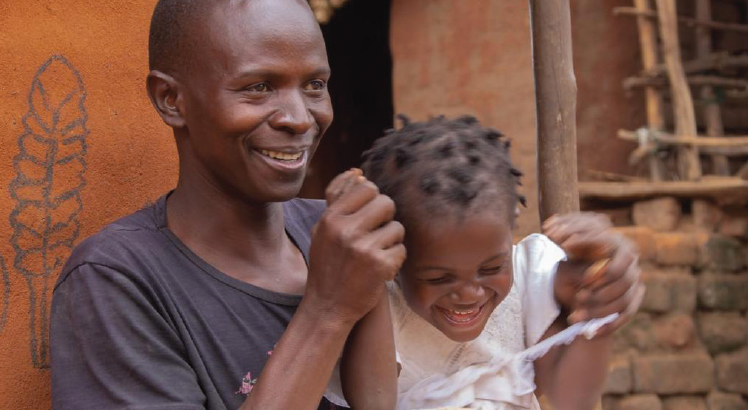‘Dad is my best friend’
Gift Kamfosi is the first teacher of his two daughters.
The 34-year-old rice vendor from Mkwepu Village in Phalombe is often seen walking or biking her four-year-old daughter, Barbara, to school. He also helps 10-year-old Ainesi do her homework.
“I dropped out in Standard Four due to poverty, but I want my daughters to learn until they achieve their dreams and become independent,” he explains.
Kamfosi has made everyday parenting roles a habit, liberating his wife to promote nutrition, sanitation and hygiene in their community.
The woman goes door to door, teaching households with pregnant women, breastfeeding mothers and children aged below five the benefits of insisting on diversified diets from six food groups.

Barbara was enrolled at the nearest Community-Based Childcare Centre (CBCC) when she was just 20 months old.
The girl, who desires to become a teacher, says her father is her has become a superhero.
“My dad is my best friend. Every morning, he wakes me up, bathes me, dresses me, packs my school bag and sees me off to school,” says the girl who goes to Chimbiri CBCC in her clustered village in Traditional Authority Nanseta.
The superdad prepares nutritious meals for her daughters. He is happily breaking the mold to challenge cultural stereotypes that confine parenting to women.
His resolve to give his children a firm foundation in life defies widespread murmurs that demean him as a “useless man” hijacking his wife’s roles.
He explains: “I am just a normal dad. As a breadwinner, I provide what my daughters want. As a parent, I am their first teacher. My actions shape the values they will grow up with.
“I don’t mind my colleagues who call me a disgrace because I only have daughters and refuse to leave everything to my wife. They believe a real man only cares about making money, not parenting. This is not true. Children don’t belong to a woman alone, but both parents.”
Kamfosi personifies the emergence of superdads in Phalombe, where the Hunger Project promotes male involvement in parenting and early childhood development with support from Unicef.
He believes his super dad roles, coupled with the time the girl spends at the CBCC, give his daughter a great start in life.
“The games and songs children play at the CBCC give them a good start in life as they acquire skills and knowledge they require to excel in school and become productive later in life. As we are close, she shares with me everything she learns,” he says.
Neighbours say Barbra is an active, intelligent, confident and curious girl.
Her father concurs: “She has moved from a quiet girl to a leader. She now likes playing with her peers and teaching them what they learn at the CBCC. At her age, she confidently recites vowels, alphabet letters and all 12 calendar months. I’m her number one fan,” Kamfosi says.
Barbra also counts money from the rice sales, the family’s mainstay.
“The roles most men assign to women have strengthened the bond between my daughters and I. Barbra freely tells me what she learned at the CBCC, what she experienced and what she saw, even what didn’t please her,” the happy father narrates.
When Kamfosi is not sourcing or selling the rice from the Lake Chilwa wetland, he takes the girl for a walk.
“During the walk, she tells me stories she wouldn’t have told me at home. I also teach her simple things like letters, words, numbers, dates and calendar months. She now counts from one to 20,” he explains.
He believes male involvement in parenting is pivotal in shattering age-old gender disparities.
Kamfoi says: “Real men do all the chores culturally believed to be women’s roles. This includes parenting. Most men, who laugh at me, may not be close to their children because they leave parenting to women.
“The criticism makes me love them more and more. I want my children to learn and achieve their dreams of becoming independent and breaking away from poverty. I don’t want them to struggle with simple additions and subtraction as I do on my business errands. I give them signposts to a bright future every day.”
Elizabeth Momba, a caregiver at Barbara’s CBCC, explains why Kamfosi has become a man to look up to when it comes to parenting: “It is important for men to take part in parenting because the baby belongs to both parents. The man often brings Barbra to the CBCC on a bike.
“His involvement helps his children open up about their dreams, fears, needs and friends. This is the best way to show children that men and women are equal.”





